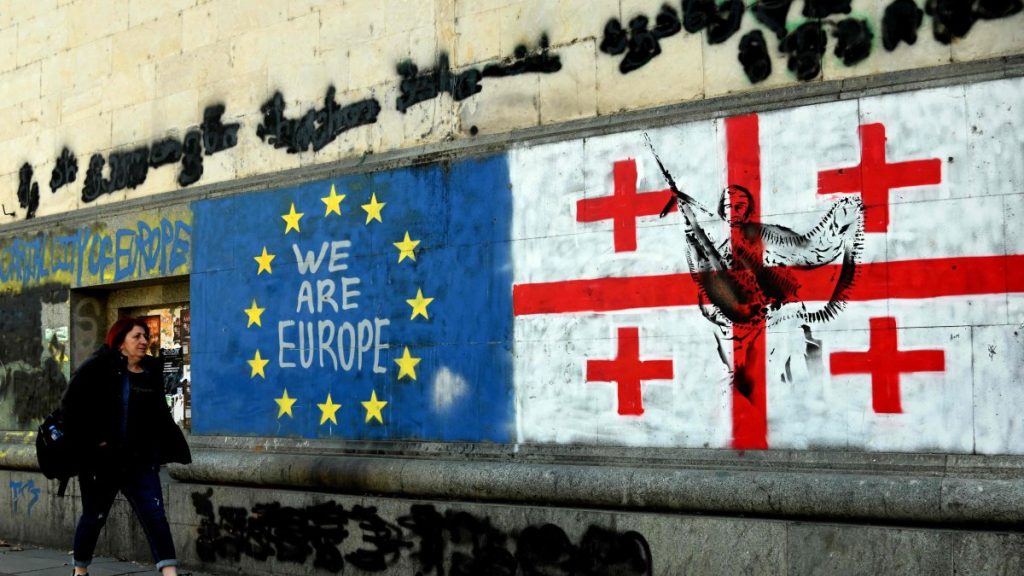Against the backdrop of the prolonged protests in Georgia that began in November 2024, which have gradually lost the momentum they once had at the end of the previous year, an important question arises: Why have these demonstrations failed to evolve into a broader, nationwide movement? As the results of the latest parliamentary elections have shown, Georgian society is deeply divided, almost evenly split. It is difficult to argue that there is an absolute majority unequivocally supporting the protests for Euro-integration and alignment with the West as the sole path for the country’s development.
This division is precisely what has allowed the ruling Georgian Dream party to maintain its grip on power with relative confidence, while the opposition’s struggle for change has grown increasingly feeble. Particularly significant is the fact that the lack of unconditional support for the pro-Western course and its values among nearly half of the population has enabled Georgian Dream to execute what can be termed a “conservative turn.” This shift, which began in 2019, has been marked by anti-liberal measures targeting political opposition, media and civil protests, as well as laws restricting the activities of oppositional nongovernmental organizations (NGOs), through controversial “foreign agents” legislation. Despite these measures, the party managed to secure nearly half of the votes in the elections, suggesting that this conservative turn has been tacitly accepted, if not outright endorsed, by a significant portion of Georgian society.
The critical question, then, is what has driven this acceptance and silent acquiescence to such policies? And why has the sharp pivot away from the West not sparked a more sustained and widespread protest on the streets of Tbilisi? One possible explanation lies in the distorted and often erroneous perception of liberalism, political freedom and Western integration that prevails among a substantial segment of Georgian society. This perception has been cultivated over more than a decade through the instruments of Russian soft power in Georgia, and it is no accident. It appears to be part of a deliberate strategy by the Russian government to discredit the image of Western countries and their agendas and to diminish their influence in Georgia.
A key component of this strategy has been the network of NGOs operating in Georgia, whose primary mission has been to promote narratives about the detrimental effects of Western democracy and liberal values on Georgian identity. Concepts such as individual rights, and freedom for ethnic and religious minorities have often been portrayed as policies that would lead to societal fragmentation, the loss of “traditional” values and the dissolution of Georgian identity in a multicultural melting pot. The goal has been to distort the understanding of Western values and democracy, fostering skepticism among the target audience. Prominent organizations such as Rossotrudnichestvo, the Gorchakov Fund, the Russkiy Mir Foundation and the Primakov Russian-Georgian Public Centre have been particularly active in this regard since the early 2010s, providing both financial and advisory support in these efforts.
Another critical element of Moscow’s soft power in Georgia has been its support for right-wing political movements and parties. Groups such as the Georgian March, the Conservative Movement and the Alliance of Patriots of Georgia have been notable examples. While the financial ties between these groups and the Kremlin have been the subject of much research, their ideological, rhetorical and tactical alignment with Moscow is undeniable. The narratives promoted by these groups are rooted in xenophobia, conspiracy theories and anti-liberal, anti-Western rhetoric. Their primary objective has not been to directly improve Russia’s image among Georgians but to weaken the West’s standing in Georgian society and mobilize those already skeptical of Western influence.
Equally important in the context of Russian soft power is the role of the media. Since 2014, the internet has become an increasingly significant source of news and political information in Georgia, with social media platforms gaining particular prominence. Against this backdrop, the expansion of Sputnik, the Russian state-owned multilingual news agency, into Georgia’s information environment since 2014 is noteworthy.
Sputnik operates not as a TV channel but through news websites, radio broadcasts and commentary, offering professionalism that surpasses many local pro-Russian media outlets. By publishing content in Georgian, Abkhaz, Ossetian and Russian, Sputnik ensures that the Kremlin’s narratives reach nearly all ethnic and linguistic groups in the country. The agency’s reporting is meticulously aligned with Russian state interests, reinforcing Moscow’s positions without deviation. Additionally, Russian state TV channels such as NTV, Channel One and Russia-1 remain among the most-watched foreign channels in Georgia, further amplifying Moscow’s influence.
In summary, the role of Russian soft power in advancing its geopolitical interests in Georgia cannot be overstated. Through a combination of state-affiliated NGOs, financial and ideological support for right-wing political movements, and a sophisticated media strategy, Russia has sought to deepen skepticism toward Western values and weaken support for Euro-integration within Georgian society. This multifaceted approach has not only allowed Moscow to maintain a foothold in Georgia but has also contributed to the internal divisions that continue to hinder the country’s path toward a more unified, pro-Western future. As Georgia stands at a crossroads, the challenge of countering this influence remains a critical task for those who envision a different trajectory for the nation.


